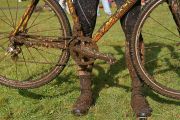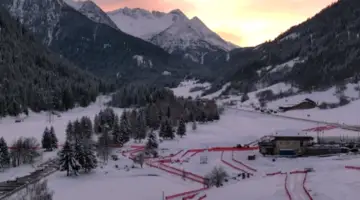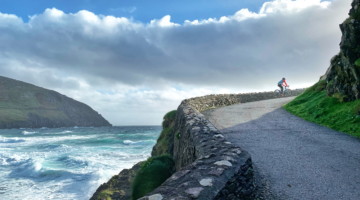 Join Andrew Bernstein as he embarks on the adventure of his first season of ‘cross and reminds us of our own newbie days. You can read his previous (third) installment here.
Join Andrew Bernstein as he embarks on the adventure of his first season of ‘cross and reminds us of our own newbie days. You can read his previous (third) installment here.
Mud. Ever since I began my ‘cross career (Can you call four races a career? Whatever.) I’ve been dreading my first experience with mud. As a roadie ‘crossing mostly for the novelty of it, I pretty much live in perpetual fear of mud. Mud, and alien abduction, but that’s a story for another day. I recently got my first introduction to riding in sticky sludge, however, the aliens are leaving me alone…for now.
Maybe mud isn’t such a big deal to some people. Perhaps some see it like any other terrain: just another thing to master. But to me, mud means less control, more bike cleaning, crappier shifting, and difficult laundry.
And yet, it was inevitable. After all, no image says ‘cross quite as clearly as a racer plastered with a greasy filth, a think coating of grime obscuring their sponsor’s logos and coating every inch of their face save their eyeballs, forming hair into clumps, and coloring any exposed skin to a uniform grey.
And that is not for me. I prefer mud at a safe distance.
I like my bikes polished and my kit freshly laundered. I feel very pro when, after a race, I look as fresh as if I were nonchalantly rolling to the start line. “Race? Yeah, I raced. No big deal. Gotta get to the podium, you know how it goes.”
But when it comes time to race, there’s no holding back, mud or not, and fortunately for me, I’ve not yet become so anal that thoughts of dirty laundry make me cringe and duck out of a race.
And that was how I became indoctrinated into mud, back in October at the BattenKross, the fourth race in the NYCross.com series, and quite possibly the only ‘cross race in the nation held in a cow pasture.
I may not be the most intimately acquainted with the nuances of cow pastures, but I do know that herds of bovine manure factories don’t do quite the maintenance job that you’re likely to encounter at a town park, a more usual ‘cross venue. Rather than grooming the lawns, cows are more likely to be digging ruts. Rather than mowing, cows are pooing. And yes, not only was this a muddy cow pasture, but it was complete with the requisite cow pies.
At the start line, a lot of racers were complaining about the ruts, mud, and cow pies, but I thought it was OK. After all, ‘cross isn’t supposed to be a walk in the park, and I don’t know how many times I’ve read about dung flying in European races, particularly those in Belgium, where cyclists fly over narrow farm trails covered in – you guessed it – cow pies.
To me, even cloistered in my world of fresh laundry and bike polish, there was something vaguely heroic about the thought of becoming plastered with cow shit. Besides, I’d just finished shellacking my legs with embrocation, so I was pretty much impervious.
The race started and I immediately gave up any notion of myself as some sort of tough guy. The cows had worked deep grooves into the pasture, and these formed a near-endless series of brake bumps. “Riding over a washboard” might be the most overused metaphor in writing about cycling, but in this case, I think it’s very apt.
Two weeks since this race, my teeth are still chattering. And that was before I got to the mud.
The first mud came at a stream crossing. The racer in front of my pointed his bike across the water and dove in. I did the same. I cringed as a cold wave splashed onto my bibs. Droplets of grey water were beading up on my liniments.
I groaned to myself, thinking of the mud now stuck to my bike. Any romantic notions I may have harbored about mud were now thoroughly out the window. The next section of the course sent us up a steep incline, and this is where we got into some deep doo doo.
I heard after the race that the farmer whose guests we were that day had actually moved his herd to another pasture for the weeks leading up to the race to try and make sure there wouldn’t be any fresh poo on the course. It was a good gesture, but I’m not sure how effective it was.
On the long climb we were churning through all sorts of droppings, grinding it into the ground, spinning out in the wetter piles, and piloting bikes around it, all the while, clumps of dung flew off spinning tires only to alight on once-clean jerseys, and the occasional, unluckily exposed eyeball.
After cresting the climb, the droppings came less frequently, but here was the mud.
I would say that on any given day I’m more likely to enjoy mud than cow droppings, but neither is going to make a list of my favorite things to ride on anytime soon. Through the mud, I got a real education in traveling sideways through turns, something which always makes the roadie in me want to reach out and grab onto anything that appears fixed in space: a tree, course tape, the odd bovine, an unsuspecting spectator, or anything else that looks like it might stop my slide.
But, I resisted the urge and kept my hands on the handlebar.
I further resisted the urge to grab a water bottle out of a spectator’s hands and spray the mud off my legs mid-way through the race when I happened to glance down and notice the gray clumps clinging to my embrocation. “No,” I told myself, “this is all part of ‘cross. It’s OK. Besides, hand-ups are illegal in ‘cross.” And yes, even though I was racing for DFL, I wouldn’t want to risk a DQ or other sanction.
So the race went, and I finished 16th out of 27 starters. At the finish line, I took stock of my muddy bike, my muddy legs, and it’s a real good thing that I couldn’t see my muddy rear-end, because I likely would have panicked with thoughts about how I’d get the bibs clean again. Given the amount of cow manure we’d been racing through, I was a little surprised that I couldn’t smell more of it.
Then I noticed some flies buzzing around my legs. “Oh. I just can’t smell myself,” I thought.
I was getting to enjoy ‘cross in dry conditions, but now I’m not so sure.
Andrew J. Bernstein is a category 3 racer on the road, category 15 ‘cross racer, and a writer based in Saratoga Springs, NY. You can learn more about him and his blog here, or contact him directly at [email protected].



























